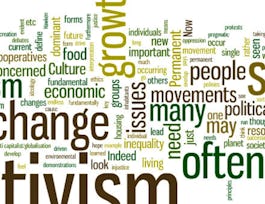This course is designed to be a fun and accessible introduction to the topic of systems theory. Systems theory describes a number of fundamental concepts that undergird a broad array of phenomena across many different social, political and natural arenas. It is from this broad applicability that the course derives its title: Pets (social), politics (political and economic) and Pandemics (natural).



Recommended experience
What you'll learn
Understand and apply intuitive concepts about abstract systems and system theoretical methods
Analyze things you may have been studying already for a while through new insights
Grapple with social justice issues, climate change, propaganda and disinformation, the origin of the unidirectionality of time
Details to know

Add to your LinkedIn profile
9 assignments
See how employees at top companies are mastering in-demand skills


Earn a career certificate
Add this credential to your LinkedIn profile, resume, or CV
Share it on social media and in your performance review

There are 5 modules in this course
Welcome to Pets, Politics, and Pandemics! During this week, Professor Simon Billinge provides an overview of the course. You will also view guidelines to support your learning journey towards thinking systematically to navigate everyday life situations.
What's included
1 video4 readings1 discussion prompt1 plugin
Most of life’s challenges consist of interactions between an individual and different groups, where the group can range from one individual through all of mankind, and indeed non-human groups. This module helps you recognize that essentially all of life’s challenges consist of interactions between an object and different groups of objects that we call a system, where the object can be a person or a thing and the system can range from one object or individual to many objects and groups of individuals throughout all of mankind. During this week's lecture series, we will explore the concept of systems behavior as it relates to such interactions, and its complexities as we apply “force” in an attempt to achieve desired outcomes.
What's included
7 videos2 readings3 assignments3 discussion prompts
System susceptibility means that the system response is never, in general, completely determined by the applied force. In this sense, systems “have a mind of their own” and it is not possible to control system responses completely. During this week’s lecture series, we will investigate how to work towards getting a desired outcome by changing the applied force, as well as the system’s susceptibility.
What's included
12 videos1 reading2 assignments3 discussion prompts
We have focused on understanding concepts related to the SRFSuP model. Now, it is time to apply what we have learned to real-world situations. During this week’s lecture, we will learn how to differentiate between education and propaganda, the concept of overwhelming force, and how to apply SRFSuP analysis to politicians.
What's included
9 videos1 reading3 assignments3 discussion prompts
Let’s apply the SRFSuP model to everyday life challenges and situations! During this week, we will be able to demonstrate our understanding of navigating life with our secret scientific pills using SRFSuP analyses.
What's included
3 readings1 assignment1 peer review1 discussion prompt1 plugin
Instructor

Offered by
Why people choose Coursera for their career




Recommended if you're interested in Physical Science and Engineering

Wesleyan University

University of California, Davis

University of Michigan

University of Michigan

Open new doors with Coursera Plus
Unlimited access to 10,000+ world-class courses, hands-on projects, and job-ready certificate programs - all included in your subscription
Advance your career with an online degree
Earn a degree from world-class universities - 100% online
Join over 3,400 global companies that choose Coursera for Business
Upskill your employees to excel in the digital economy


